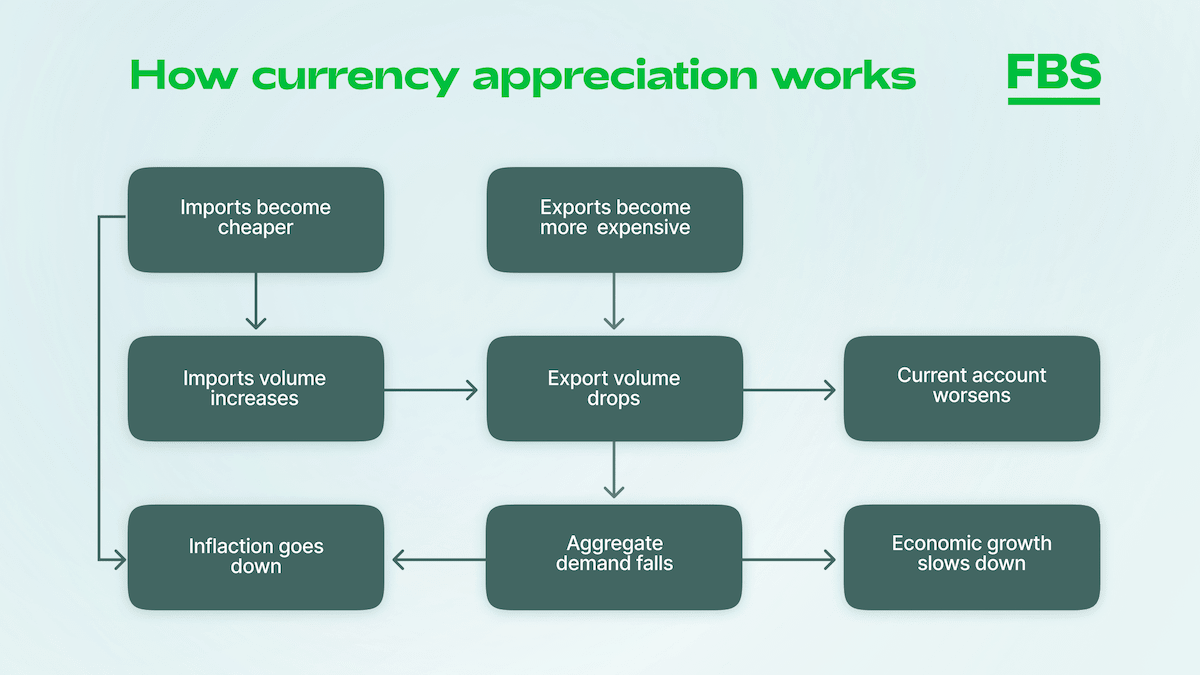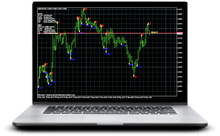Currency Appreciation
Währungsaufwertung
Was ist eine Währungsaufwertung?
Währungsaufwertung ist die Aufwertung einer Währung gegenüber anderen Währungen oder gegenüber Gold. Wenn das Wachstum einer Währungseinheit weniger als ein paar Prozent beträgt, wird es als Marktfluktuation betrachtet, aber wenn es mehr ist, wird es als Währungsaufwertung angesehen.
Auf dem Devisenmarkt handeln die Händler mit Währungspaaren, um durch den Anstieg des Kurses der Basiswährung gegenüber der Gegenwährung einen Gewinn zu erzielen. Um den Wert einer bestimmten Währung schnell zu berechnen, verwenden Sie den Währungsumrechner.
Wie funktioniert Währungsaufwertung?
Am häufigsten kommt es zu einer Währungsaufwertung, wenn es notwendig ist, die Inflationsrate zu senken. Dies kann künstlich geschehen, d. h. durch Währungsinterventionen. Musste die Zentralbank oder die Regierung früher das Volumen der Goldreserven erhöhen, so geschieht dies heute durch den Ankauf ausländischer Währung im Tausch gegen inländische Währung. Dadurch erhöht sich der Wechselkurs der Landeswährung.
Zu einer natürlichen Währungsaufwertung kommt es, wenn sich die Marktstimmung ändert und die Nachfrage nach der nationalen Währung des Landes steigt.
Währungsaufwertung und Aktien
Eine Aktie ist ein Wertpapier, das das Recht eines Aktionärs bestätigt, einen Anteil an einem Unternehmen zu halten. Selbst wenn Sie nur einen minimalen Anteil an dem Unternehmen besitzen, haben Sie Anspruch auf Dividenden und können auch an der Wertsteigerung der Aktien verdienen, wenn Sie sich zum Verkauf entschließen.
Der Wert der Aktien hängt in erster Linie vom Erfolg des Unternehmens, des Wirtschaftssektors und natürlich der Weltwirtschaft ab. Die Geschäftslage des Unternehmens und damit auch der Aktienkurs werden unter anderem durch den Wechselkurs der Landeswährung und die Inflation beeinflusst. Je höher die Inflationsrate ist, desto geringer ist die reale Rendite der Aktie und umgekehrt. Je nachdem, ob die Währung steigt oder fällt, können Sie vorhersagen, wie sich dies auf die Zahlungsfähigkeit des Unternehmens und den Wert seiner Aktien auswirken wird.
Außerdem sollte man darauf achten, ob der Emittent ein Exporteur oder Importeur ist. Eine Aufwertung ist vor allem für Unternehmen von Vorteil, die Importe tätigen, da die Preise für ausländische Waren sinken.
Wichtigste wirtschaftliche Auswirkungen der Währungsaufwertung
Die Folgen der Währungsaufwertung lassen sich wie folgt zusammenfassen:
- Anstieg der Exportkosten. Die Exporte sinken, weil der Verkauf von Waren ins Ausland dem Land weniger Geld einbringt. Folglich sinkt die inländische Produktion, weil es weniger rentabel ist, inländische Waren zu produzieren und im Ausland zu verkaufen, als ausländische Waren zu importieren. Die Abwertung der Landeswährung wiederum führt zu einem Rückgang der Kaufkraft ausländischer Investitionen und damit zu einem Kapitalabfluss.
- Günstigere Importe. Mit der Aufwertung der heimischen Währung wird es profitabler, ausländische Waren und Vermögenswerte zu erwerben, da sie zu einem niedrigeren Preis als im Inland gekauft werden können. So wird die Inflationsrate durch den Zustrom billiger Exportgüter gesenkt.
Das folgende Diagramm veranschaulicht dies:

Faktoren, die eine Währungsaufwertung verursachen
Finanzanalysten nennen zwei Gründe für die Währungsaufwertung:
- Inflation und Zinssätze. Wie bereits erwähnt, sind der Hauptgrund für eine Währungsaufwertung die hohe Inflation und die niedrigen Realzinsen. Die Landeswährung wertet ab, was zu niedrigeren Realzinsen und höheren Rohstoffpreisen führt. Unter diesen Umständen muss die Landeswährung stabilisiert werden.
- Die Stimmung der Anleger. Dies ist der zweite, aber nicht minder wichtige Grund, der sich aus dem Prozentsatz der Inflation ergibt. Bei einer hohen Inflation ist es nicht rentabel, in Aktien einheimischer Unternehmen zu investieren, da die Dividenden gering ausfallen werden. Und wenn die Inflationsrate den Zinssatz übersteigt, sind sie sogar noch schlechter — negativ.
Anleger und Händler können die globalen Finanzmärkte nach den höchsten Währungen beobachten und auf Signale und Ereignisse achten, die zu einer Aufwertung einer Währung führen könnten.
Beispiele für Währungsaufwertung
Als Beispiel für eine natürliche Währungsaufwertung können wir den Anstieg des Schweizer Frankens (CHF) im Jahr 2015 betrachten. Die Schweizerische Nationalbank gab ihre bisherige Finanzpolitik auf und hörte auf, den CHF-Wechselkurs zu kontrollieren. Dies führte zu einem starken Anstieg der Schweizer Landeswährung um 40 % (38 % gegenüber dem USD und 41 % gegenüber dem EUR, um genau zu sein) und hatte erhebliche Auswirkungen auf die Weltwirtschaft.
Und die künstliche Währungsaufwertung, die absichtlich vorgenommen wird, um die Inflation zu senken, fand beispielsweise in China im Jahr 2005 statt. Die Regierung gab den festen CNY/USD-Wechselkurs zugunsten einer Bindung an einen Währungskorb als Teil der neuen Finanzpolitik auf. Auf diese Weise wurde der Wert des CNY zunächst um 2 % und bis 2010 um mehr als 20 % erhöht.
Fazit
Die Neubewertung von Währungen ist kein einfacher Prozess, der ohne den Einfluss des Staates und der Zentralbank auf die Wirtschaftspolitik nicht möglich ist. Sie hat sowohl positive als auch negative Auswirkungen auf die Finanzmärkte, die Händler, die Investoren und die einfachen Menschen gleichermaßen. Deshalb ist es wichtig, die Wechselkurse und das Wirtschaftsgeschehen zu verfolgen, immer auf dem Laufenden zu sein und seine Geldbörse rechtzeitig zu sichern.
2022-12-20 • Aktualisiert














